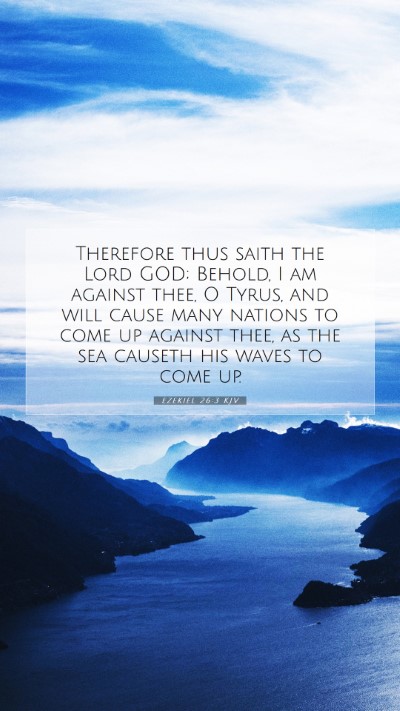Ezekiel 26:3 - Understanding the Prophetic Warning Against Tyre
Bible Verse: Ezekiel 26:3 - "Therefore thus says the Lord God: Behold, I am against you, O Tyre, and will bring up many nations against you, as the sea brings up its waves."
Bible Verse Explanation
The verse provides a profound insight into God's judgment against Tyre, a prominent Phoenician city known for its wealth and maritime power. Through the prophet Ezekiel, God announces His intention to send many nations against Tyre, symbolically likening the invading forces to the waves of the sea—powerful and overwhelming.
Bible Verse Interpretations
This passage signifies God's sovereignty over nations and His judgment against prideful cities that oppose Him. Tyre, known for its commerce and idolatry, faced dire consequences for its actions. The imagery of the sea's waves emphasizes the inevitability and might of the impending invasion.
Insights from Public Domain Commentaries
- Matthew Henry: He interprets the verse as a clear declaration of God's hostility towards Tyre due to its arrogance and history of oppression against Israel. Henry emphasizes how God uses foreign nations as instruments of His judgment.
- Albert Barnes: Barnes notes the historical context, explaining that Tyre's pride and luxury would lead to its downfall. He also highlights how this judgment serves as a warning for other nations to heed God's sovereignty.
- Adam Clarke: Clarke provides an analysis of the metaphorical language, discussing how the waves of the sea represent chaos and destruction. He sees this as a foreshadowing of the Babylonians' military campaigns against Tyre.
Historical Context
In the context of biblical prophecy, Tyre was significant due to its trade and location. The prophecy comes during a time when Babylon was rising, and the influence of neighboring nations threatened its prosperity. The destruction of Tyre foretold both a physical and spiritual decline, highlighting the relationship between a nation's integrity and its standing before God.
Application and Reflection
For modern readers, this verse serves as a reminder of the consequences of pride and disobedience to God. It challenges individuals and nations to reflect on their moral standing and the importance of humility before the Creator. The prophecy invites believers to consider God’s overarching justice and the transient nature of worldly power.
Cross References
- Isaiah 23:1-18: A prophecy concerning the fall of Tyre.
- Jeremiah 25:22: Mention of Tyre among the nations that will face God’s judgment.
- Ezekiel 27: A lament for Tyre, illustrating its fall and the impact on global trade.
Conclusion
As we embark on our journey of Bible study lessons and Bible verse commentary, Ezekiel 26:3 serves as a poignant reminder of the profound truths within Scripture analysis. By reflecting on the meaning of this verse and its implications, we cultivate a deeper Bible verse understanding and appreciation for the divine narrative woven throughout history.
Further Study
For those engaged in Bible study groups or seeking online Bible study, consider exploring the relevance of Tyre's judgment in contemporary contexts. Discuss the themes of divine justice, the significance of humility, and the characteristics of a society that honors God.


